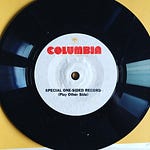One of the greatest cons in rock and roll started in 1969. An outfit called Delta Promotions recruited musicians to tour the country posing as the Zombies, the Animals, and the Archies, bands that were either broken up at the time (the Zombies and the Animals) or were cartoon characters (the Archies). The bands played their namesakes’ hits and drew fans who only knew the acts from their songs and the photos on record sleeves. The scheme didn’t last long. After threats both physical and legal, Delta Promotions closed up shop the following year.
Delta’s plan is an amusing chapter in music history—a sideshow to the major live music events of the time like Woodstock or Altamont. But lately, Delta’s moves have begun to seem almost influential.
This week, Rolling Stone ran a story about classic rock bands touring with one—or sometimes none—of their original members. This is an evolution of a longstanding practice in music. Bands replace members all the time, sometimes in the group’s peak creative years (which tend to overlap with the years in which members are most susceptible to the hazards of excess). The Rolling Stones have had hits with three different guitar players. AC/DC lost their original singer and found a replacement whose debut became the band’s best-selling album. Sometimes bands add members to evolve. Fleetwood Mac produced their most enduring records after adding Stevie Nicks and Lindsey Buckingham in the mid-‘70s.
The Rolling Stone article, though, was concerned with bands replacing members as part of the transition from hitmakers to legacy touring acts. This happens all the time, too. Guns ’n’ Roses have cycled through so many musicians, the band’s membership has its own Wikipedia page with multiple charts showing who was doing what when. The Temptations tour with only one member of the “Classic Five”—Otis Williams.
Moves like this raise the question of what a band actually is. If the swap happens in a band’s prime years, then fans usually treat the change as epochal, because the new members change the sound or spirit of the band. The first few years of The Rolling Stones could be described as their Brian Jones years, while the years after his death are the Mick Taylor or Ron Wood years. The band is always the Rolling Stones, and their eras are clearly delineated.
If a band is past its creative and commercial peak when the substitutions start, the question gets harder to answer. What are the Who, for example? If you listen to their classic records (I suggest starting with The Who Sell Out), you’ll hear guitarist and songwriter Pete Townshend, drummer Keith Moon, bassist John Entwistle, and singer Roger Daltrey. Moon’s inventive and unique drumming is particularly central to the band’s sound. But Moon died in 1978. Entwistle died in 2002. The band has made four albums without all of their original members, but they don’t play many songs from these records live. If you buy a ticket to see the Who, you’ll see Townshend and Daltrey with a backing band.1
There’s a thought experiment called The Ship of Theseus that goes something like this: King Theseus’s boat is placed in a museum. Over time, the wood rots and the museum replaces it, board by board, year by year, until every part of the boat has been replaced with an exact replica. Is this still the same boat?
If it’s not the same boat, then at some point the boat stopped being the boat. If Townshend, Daltrey, and their band aren’t the Who, then at what point did they stop being the Who?2 Does it matter what the pieces of the ship are replaced with? Since 1996, Moon’s godson (and Ringo Starr’s biological son) Zak Starkey has played drums with the band. Does that change the equation?3
If you believe the ship of Theseus is still the ship after the replacements, then that raises a question of what it means to be the ship. If a band replaced every member but still toured and played the same songs, would it be the same band?
Several bands seem ready to answer this question with a yes.
One of those bands is Lynyrd Skynyrd. The touring version of the group currently has one original member. In the Rolling Stone article, frontman Johnny Van Zant (who is the little brother of the band’s original singer) defended touring under the name of a band he didn’t start or make famous. “Look at Ford Motor Company,” he says. “Guys started it out a long time ago. Somebody went in there going, ‘OK, we got something here. Let’s carry it on.’ You know, I wouldn’t have a Ford Raptor right now in my driveway if it weren’t for that.”
Van Zant’s comments imply there’s not a line when the original Lynyrd Skynyrd became the one playing Vegas residencies and theme cruises today. They also imply there’s not a line between art and commerce.
To be fair to this quote, you could look at a band as a business—one that sells music, t-shirts, and tickets. But that’s a view that sees profit as the primary reason to make music. In this case, the band isn’t just a business, it’s a holding company. It manages an asset called Lynyrd Skynyrd, which exists to make money for shareholders so they can buy $80,000 pickup trucks like the one Van Zant namedrops. The best way for this asset to make money is to tour.
From the article:
Skynyrd manager [Ross] Schilling has done the research and seen what happens when a band from that era is no longer on the road in whatever form. “The classic-rock radio spins and the digital streams slow down,” he says. “The whole catalog takes a large percentage dip. I’m not saying the music is going to die, but it’s going to lose its front-and-center attention once the live part stops.”
Maybe the real answer to the Ship of Theseus question depends on how much tickets to the museum cost.
And it is a museum at this point. Schilling says he’s not warning that “the music will die,” but it’s hard to see it as alive when the industry is scrambling to keep it the same as it was 50 years ago. The acts aren’t growing or evolving, they’re adhering to the past and profiting off nostalgia. Rock music is in its mothball stage.
This phase is going to last a while. It’s been going on for so long already that the tribute acts have outlasted the original. Almost all of the classic rock bands that are still touring are playing with replacement musicians who have been in the band longer than the members they replaced. Lynyrd Skynyrd has put out more records in their revived form than they did in their original lineup. None have sold as well as the original band’s. There’s a reason people joke about never wanting to hear the words “here’s something off our new album” at a concert. The bands aren’t making new music that resonates. Someone devoted to a living art form might take this as a sign to try something different, instead of retreating into safety and old standards.4
At the center of the Rolling Stone article is the band Trouble No More. They’re the work of CJ Strock, a talent agent who worked with the Allman Brothers Band. The Allman Brothers officially ended eight years ago, but, seeing a market opportunity, Strock recruited a new group to play the band’s music, with the official endorsement of the Allman Brothers estate. It’s a new brand from the Allman Brothers Band Corporation, designed to generate profits.5
“If Trouble No More didn’t exist, there would be no live marketplace for the [Allman Brothers Band] brand,” Strock says. That means copycat acts with just as many members of the Allman Brothers as Trouble No More might seize the trademark, hurting the market for t-shirts, vinyl reissues, and what the article describes as “a line of cannabis products.”
Central to the plan is the need to build a new audience for merchandise. That’s why Strock says the music will change…slightly. Trouble No More plays the songs a little bit faster. “It’s tough for younger people to embrace something owned by their grandparents and that’s not seen as super cool,” Strock tells Rolling Stone.6 “I’m trying to take that original music and have super-cool men and women in the band play this music like it’s their own.”
This sounds less like it’s an attempt to help new musicians find fans and fame, and more like a strategy to get old fans to forget they’re seeing something new and to get new fans to forget they’re hearing something old. Maybe the branded weed will help.
I don’t think this is going to stop with classic rock. For one, the definition of “classic rock” has ballooned to include 21st century emo-adjacent pop-rock. Second, the Theseus bands exist on the blessing of the original band members’ estates. With artists of all genres now selling off their catalogs and publishing rights, legacies will be in the hands of equity firms that expect to see a return on their investment.
The question in rock music used to be “is it better to burn out or fade away?” Classic rock acts are trying to have it both ways. The bands burned out in the ‘70s. Now their brands are back on the road, generating profits for shareholders until fading away into irrelevance.
Another solution to the Ship of Theseus question is to think differently about the ship and its parts. Instead of seeing the mast as either the original or the replacement, think of it as “the mast from 1200-2000.” This means the ship is more than a collection of parts arranged a certain way—it’s a collection of parts that existed a certain way at a certain time.
The bands that made hit albums in the ‘60s or ‘70s is not the bands that are touring now. The first bands, the ones that existed before their names signified living tributes or human jukeboxes, are in their own time. They can’t be remade, but they will always exist. We have records. We can put them on whenever we want.
I caught some of a recent Who concert on PBS last week and was impressed Roger could still pull off the scream in “Won’t Get Fooled Again.” Having nearly fractured my thumb attempting guitar windmills, I’m also impressed Pete can do them at any age.
This is further complicated by the fact that every band is different. Some bands have one or two members who seem to be in charge, like Jeff Lynne with Electric Light Orchestra. In cases like this, some members are almost interchangeable while others are existential. The Beach Boys have tested which members fall into which category more than any other group.
Years ago, I saw The Smashing Pumpkins play at a festival. The two original members on stage—Billy Corgan and Jimmy Chamberlain—were also in the post-Smashing Pumpkins band Zwan. The act I saw was billed as Smashing Pumpkins, but could have just as accurately been called Zwan.
Bands sometimes reinvent themselves after a change in membership, like New Order forming out of the remaining members of Joy Division. Other times, artists go solo when their group dissolves, like Peter Gabriel or Phil Collins. Sometimes I imagine that Van Halen might have not hired Sammy Hagar and instead become a synth-rock band after the departure of David Lee Roth, but, I’ll save this for a “what if…” edition of the newsletter.
It’s funny the band is called Trouble No More. That’s the title of a popular song in the Allman Brothers catalog, but it’s a cover. Muddy Waters did the original.
The idea of assembling a young cover band to build excitement in older music reminds me of Devo 2.0. As members of Devo 1.0 tell it, in the early 2000s, Disney approached them about a project for kids. The band pitched the idea of a group of children who would perform Devo songs. It happened. I can’t say for sure how much of the project was a joke or performance art to Devo. I’m assuming a lot of it was based on the band’s philosophy, this interview, and the finished project.

















Share this post